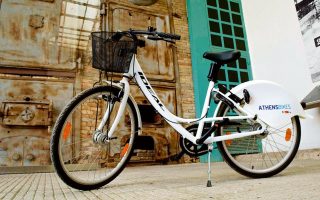Documentary tells harrowing story of Syrian teens accused of migrant smuggling

Seventeen-year-old Alsaleh is on the phone with his mom, asking for news from home. It's not good: Kobani is being turned to rubble, the situation is out of control. Her pain, though, stems from something entirely different. “How long will you be in for, son?” she asks again. “Don't worry about me. The trial will start any day now. Let's have faith,” he answers.
I don't know how else to describe Marianna Economou's documentary “The Longest Run” but a punch to the stomach. The filmmaker has succeeded in making a thriller with real-life characters while crafting an excellent reportage, as she turns her lens on another drama unfolding within that of the refugee crisis, in Greece's juvenile detention centers. This is where dozens of refugee and migrant minors accused of people smuggling face prison sentences that may come to as long as 30 years. They are children and teenagers used by real migrant smugglers in Turkey to steer boats to Greece, in exchange for a free ride. When they arrive, they are arrested by the Greek authorities, a fact that has been admitted by Greek Police Brigadier General Zacharoula Tsirigoti.
Economou's camera follows Alsaleh from Syria and Jasmin from northern Iraq, both in their late teens and both in pretrial custody at a prison in Volos, central Greece. At the time of filming, they had already been there for 18 months. They have learned Greek – Alsaleh is more fluent and helps Jasmin in all his communication – and attend classes at the prison school, watch kids' shows on TV, call their parents whenever they can and spend most of their time worrying.
“Jasmin won't survive being convicted,” says Alsaleh. “He's a child who need a grownup next to him.”
Economou was the first person to secure a license to film inside the prison, although she had to wait a long time for the Justice Ministry to approve her request and was eventually given permission to make 15 visits.
“I started by sitting in on the classes conducted by Costas Magos inside the prison,” she tells Kathimerini. “There were eight to 10 kids, all accused of migrant smuggling and most awaiting trial. I instantly became interested in Jasmin, the youngest, as he seemed completely lost. He had no understanding of his predicament, of how serious it was or what he had to do.”
Her interest in Jasmin led her to his loyal friend in prison, Alsaleh, also from Syria. The viewer's anxiety peaks as the date of the trial approaches. Jasmin does not have any papers and cannot prove his age, so he faces the risk of being tried as an adult and being handed a much harsher sentence. Having seen these children being children who have been forced to grow up fast on the journey away from war and to prison, who try to give their families' courage in brief, heart-wrenching phone calls, and who struggle to communicate their stories and the threats they heard from the smugglers (“I'll throw all the women and children in the water if you don't drive the boat!”) to their lawyers, watching how the case evolves is almost too hard. At the trial, the prosecutor addresses the teenager with complete disdain, appearing too busy to listen to his story in Arabic.
“I had never been in a prison before,” says Economou. “The experience was incredible, shocking. The children were very cautious at first. They didn't trust anyone. ‘You won't come back, miss, no one does,’ they'd say. ‘I will come back, you'll see,’ I'd tell them. With time, we built a bond of trust.”
Economou was also able to gain the trust of the prison guards, who gave her and her camera operator more freedom of movement around the facility as their initial reservations dropped.
To find out what happened at Jasmin's trial, catch the documentary at Danaos (109 Kifissias & Panormou, tel 210.692.2655) on April 23 and 24.





